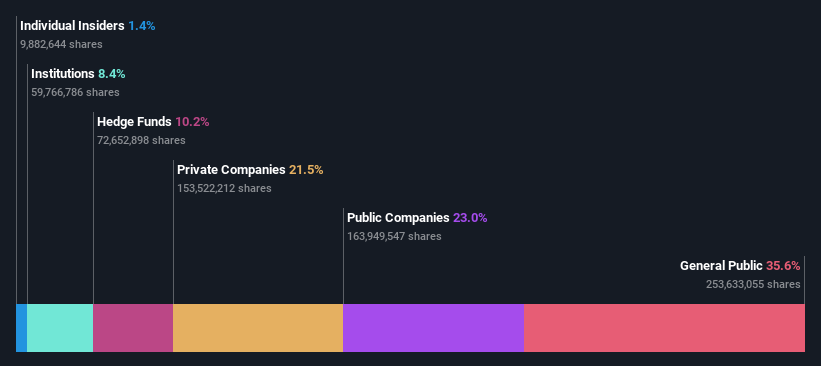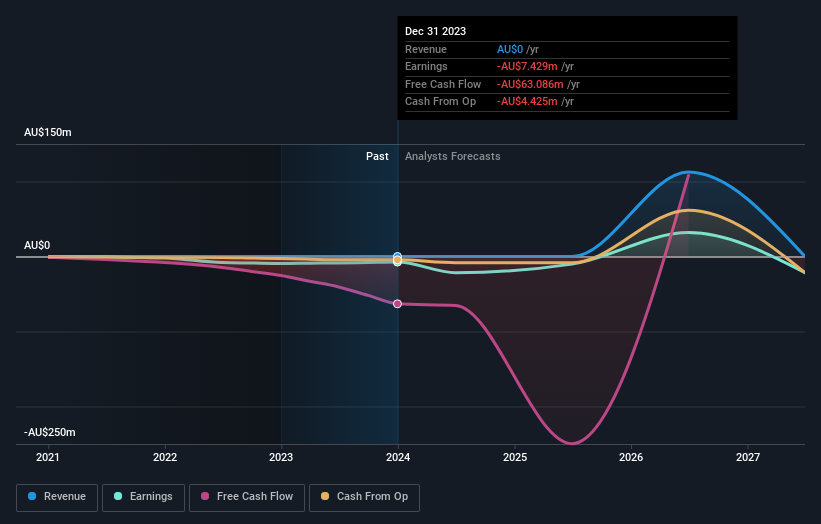- Australia
- /
- Metals and Mining
- /
- ASX:DLI
Delta Lithium Limited's (ASX:DLI) market cap surged AU$25m last week, retail investors who have a lot riding on the company were rewarded

Key Insights
- The considerable ownership by retail investors in Delta Lithium indicates that they collectively have a greater say in management and business strategy
- A total of 4 investors have a majority stake in the company with 55% ownership
- Using data from analyst forecasts alongside ownership research, one can better assess the future performance of a company
If you want to know who really controls Delta Lithium Limited (ASX:DLI), then you'll have to look at the makeup of its share registry. We can see that retail investors own the lion's share in the company with 36% ownership. Put another way, the group faces the maximum upside potential (or downside risk).
Clearly, retail investors benefitted the most after the company's market cap rose by AU$25m last week.
In the chart below, we zoom in on the different ownership groups of Delta Lithium.
Check out our latest analysis for Delta Lithium

What Does The Institutional Ownership Tell Us About Delta Lithium?
Institutions typically measure themselves against a benchmark when reporting to their own investors, so they often become more enthusiastic about a stock once it's included in a major index. We would expect most companies to have some institutions on the register, especially if they are growing.
We can see that Delta Lithium does have institutional investors; and they hold a good portion of the company's stock. This implies the analysts working for those institutions have looked at the stock and they like it. But just like anyone else, they could be wrong. If multiple institutions change their view on a stock at the same time, you could see the share price drop fast. It's therefore worth looking at Delta Lithium's earnings history below. Of course, the future is what really matters.

It would appear that 10% of Delta Lithium shares are controlled by hedge funds. That's interesting, because hedge funds can be quite active and activist. Many look for medium term catalysts that will drive the share price higher. Mineral Resources Limited is currently the largest shareholder, with 23% of shares outstanding. With 11% and 11% of the shares outstanding respectively, Idemitsu Mt Ida Pty Ltd and Hancock Prospecting Pty Ltd are the second and third largest shareholders.
Our research also brought to light the fact that roughly 55% of the company is controlled by the top 4 shareholders suggesting that these owners wield significant influence on the business.
While it makes sense to study institutional ownership data for a company, it also makes sense to study analyst sentiments to know which way the wind is blowing. There are plenty of analysts covering the stock, so it might be worth seeing what they are forecasting, too.
Insider Ownership Of Delta Lithium
The definition of an insider can differ slightly between different countries, but members of the board of directors always count. Management ultimately answers to the board. However, it is not uncommon for managers to be executive board members, especially if they are a founder or the CEO.
I generally consider insider ownership to be a good thing. However, on some occasions it makes it more difficult for other shareholders to hold the board accountable for decisions.
We can report that insiders do own shares in Delta Lithium Limited. In their own names, insiders own AU$2.6m worth of stock in the AU$189m company. This shows at least some alignment, but we usually like to see larger insider holdings. You can click here to see if those insiders have been buying or selling.
General Public Ownership
The general public, who are usually individual investors, hold a 36% stake in Delta Lithium. While this size of ownership may not be enough to sway a policy decision in their favour, they can still make a collective impact on company policies.
Private Company Ownership
Our data indicates that Private Companies hold 22%, of the company's shares. It might be worth looking deeper into this. If related parties, such as insiders, have an interest in one of these private companies, that should be disclosed in the annual report. Private companies may also have a strategic interest in the company.
Public Company Ownership
Public companies currently own 23% of Delta Lithium stock. We can't be certain but it is quite possible this is a strategic stake. The businesses may be similar, or work together.
Next Steps:
While it is well worth considering the different groups that own a company, there are other factors that are even more important. For example, we've discovered 2 warning signs for Delta Lithium (1 makes us a bit uncomfortable!) that you should be aware of before investing here.
If you are like me, you may want to think about whether this company will grow or shrink. Luckily, you can check this free report showing analyst forecasts for its future.
NB: Figures in this article are calculated using data from the last twelve months, which refer to the 12-month period ending on the last date of the month the financial statement is dated. This may not be consistent with full year annual report figures.
New: Manage All Your Stock Portfolios in One Place
We've created the ultimate portfolio companion for stock investors, and it's free.
• Connect an unlimited number of Portfolios and see your total in one currency
• Be alerted to new Warning Signs or Risks via email or mobile
• Track the Fair Value of your stocks
Have feedback on this article? Concerned about the content? Get in touch with us directly. Alternatively, email editorial-team (at) simplywallst.com.
This article by Simply Wall St is general in nature. We provide commentary based on historical data and analyst forecasts only using an unbiased methodology and our articles are not intended to be financial advice. It does not constitute a recommendation to buy or sell any stock, and does not take account of your objectives, or your financial situation. We aim to bring you long-term focused analysis driven by fundamental data. Note that our analysis may not factor in the latest price-sensitive company announcements or qualitative material. Simply Wall St has no position in any stocks mentioned.
Have feedback on this article? Concerned about the content? Get in touch with us directly. Alternatively, email editorial-team@simplywallst.com
About ASX:DLI
Delta Lithium
Explores for and develops lithium properties in Western Australia.
High growth potential with excellent balance sheet.


